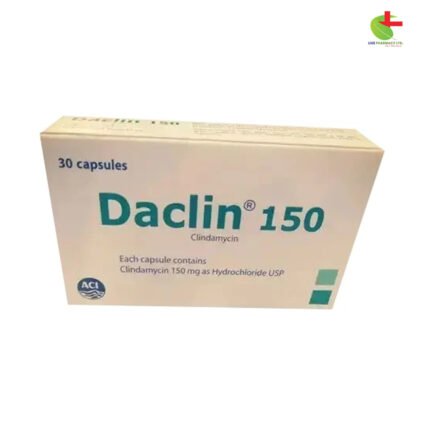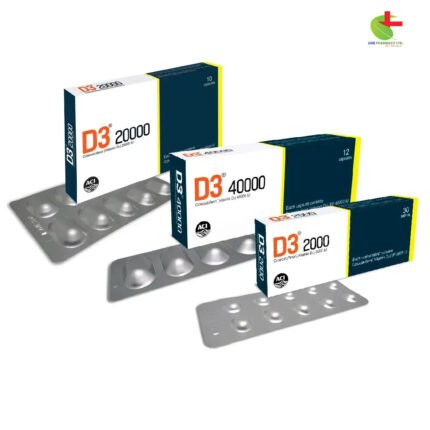Daclin 300
150.50৳ Strip
- Daclin (Clindamycin) is a broad-spectrum antibiotic used to treat a variety of bacterial infections, including respiratory, skin, bone, and dental infections.
- It targets both aerobic Gram-positive bacteria and anaerobic bacteria, providing effective treatment for mild to severe infections.
- Available in oral, intravenous, and topical forms, Daclin is also used in combination therapy for multi-drug resistant Plasmodium falciparum malaria.
- Always follow a healthcare provider’s advice before use.
 Brand
Brand
|
ACI Limited |
|---|---|
 Generics
Generics
|
Clindamycin |
 Type
Type
|
Capsule |
Indications for Daclin (Clindamycin)
Daclin (Clindamycin) is an effective antibiotic for treating a variety of bacterial infections caused by susceptible anaerobic bacteria and certain Gram-positive strains, such as Streptococcus, Staphylococcus, and Pneumococcus. These infections include:
- Upper respiratory tract infections
- Lower respiratory tract infections
- Skin and soft tissue infections
- Bone and joint infections
- Pelvic infections
- Intra-abdominal infections
- Septicemia and endocarditis
- Dental infections
Daclin can also be used in combination with quinine or amodiaquine to treat multi-drug resistant Plasmodium falciparum infections.
Note: Please follow the advice of a registered healthcare professional before using this medication.
Description of Daclin
Daclin is a lincosamide-class antibiotic used to treat infections caused by bacteria sensitive to clindamycin. It is a semi-synthetic derivative of lincomycin.
It is effective against the following pathogens:
- Aerobic Gram-Positive Cocci: Staphylococcus aureus, Staphylococcus epidermidis (both penicillinase-producing and non-penicillinase strains), Streptococci, and Pneumococci.
- Anaerobic Gram-Negative Bacilli: Bacteroides species, Fusobacterium species.
- Anaerobic Gram-Positive Bacilli: Propionibacterium, Eubacterium, Actinomyces.
- Anaerobic and Microaerophilic Gram-Positive Cocci: Peptococcus species, Peptostreptococcus species, microaerophilic streptococci, and Clostridium perfringens.
Dosage & Administration of Daclin
The dosage of Daclin varies depending on the severity of the infection and the form of the medication being used.
Oral Capsules (Clindamycin)
- For serious infections: 150-300 mg every six hours.
- For more severe infections: 300-450 mg every six hours.
To avoid irritation, Daclin capsules should be taken with a full glass of water. For certain infections like skin and soft tissue infections (SSTIs) and respiratory tract infections (RTIs), studies suggest that a twice-daily dose of 300 mg can maintain plasma concentrations over MIC90 for more than 12 hours. For bone and joint infections or diabetic foot infections, the recommended dose is 300 mg 3-4 times daily.
Oral Solution (Clindamycin Powder for Reconstitution)
- For serious infections: 8-12 mg/kg/day, divided into 3-4 doses.
- For severe infections: 13-16 mg/kg/day, divided into 3-4 doses.
- For more severe infections: 17-25 mg/kg/day, divided into 3-4 doses.
For children weighing 10 kg or less, the minimum dose is 37.5 mg (½ teaspoon) 3 times daily.
IV/IM Injection
- For serious infections: 600-1200 mg/day, divided into 2-4 doses.
- For more severe infections: 1200-2700 mg/day, divided into 2-4 doses.
For life-threatening infections, the dose may be increased up to 4800 mg daily.
Note: Single IM injections should not exceed 600 mg.
Neonates (under 1 month): 15-20 mg/kg/day, divided into 3-4 doses.
Pediatric patients (1 month to 16 years): 20-40 mg/kg/day, divided into 3-4 doses.
Treatment of beta-hemolytic streptococcal infections should last at least 10 days.
Drug Interactions
Daclin may enhance the effects of other neuromuscular blocking agents, so caution is advised when used concurrently. It is also not recommended to administer Daclin and erythromycin together, as in vitro studies have shown antagonistic effects between the two.
Contraindications
Daclin should not be used by individuals who have a known allergy to clindamycin or any of the ingredients in the formulation.
Side Effects
Common side effects of Daclin include:
- Abdominal discomfort
- Nausea, vomiting, and diarrhea
- Esophagitis and esophageal ulcers
- Skin reactions such as rashes, pruritus, and urticaria.
Pregnancy & Lactation
- Pregnancy: Category B. Clindamycin does cross the placenta. It should only be used during pregnancy when clearly necessary.
- Lactation: Clindamycin is excreted in breast milk and should be used cautiously in nursing mothers.
Precautions & Warnings
Caution should be exercised when prescribing Daclin to patients with a history of gastrointestinal disorders, particularly colitis.
Use in Special Populations
- Newborns & Infants: Careful monitoring of organ function is recommended when administering Daclin to infants and newborns (birth to 16 years).
- Geriatric Patients: No dose adjustment is necessary for elderly patients.
Overdose & Treatment
Overdosing with Daclin is rare, but symptoms similar to normal side effects can be expected. There is no specific antidote. Overdose management should include gastric lavage, but haemodialysis or peritoneal dialysis will not effectively remove Daclin from the bloodstream.
Therapeutic Class
Daclin belongs to the Macrolides class of antibiotics.
Reconstitution & Preparation
For oral solution: Shake the bottle to loosen the powder. Add 80 ml of cooled, boiled water in two portions, shaking after each addition until the powder dissolves completely. Use within two weeks when stored at room temperature.
For intravenous (IV) use: Daclin phosphate must be diluted before IV administration. The final concentration should not exceed 18 mg/mL, and infusion rates should not exceed 30 mg per minute. Avoid administering more than 1200 mg in a single one-hour infusion. Single IM doses should not exceed 600 mg.
Storage Instructions
Store Daclin below 30°C, away from light and moisture. Keep out of reach of children.













Reviews
There are no reviews yet.